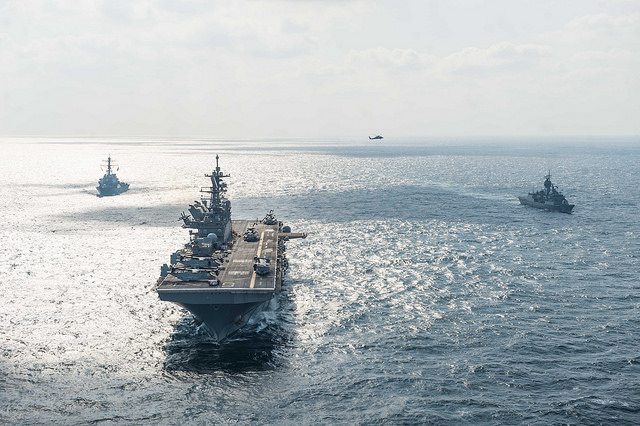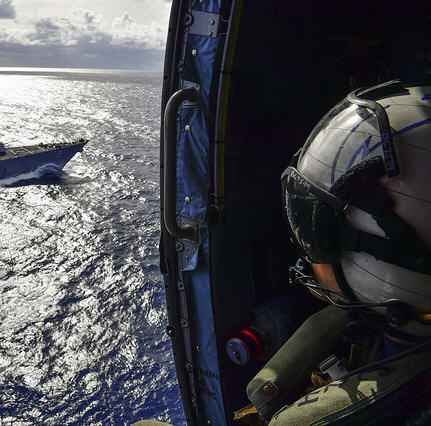ONI Intelligence Analyst
Intel.gov recently sat down with an analyst from the Office of Naval Intelligence to learn more about how she supports the Navy towards mission success.
Ms. K. really likes her job as an intelligence analyst at the Office of Naval Intelligence. She admits that her somewhat obsessive focus on work “might be a little bit unhealthy,” but the subject matter is so engaging and the sense of community at ONI is so strong, she wouldn’t have it any other way.

Ms. K. (who asked that her full name not be used) is upholding a long tradition of providing maritime threat information to naval fleet commanders and policy-makers. Established in 1882, ONI is the U.S.’s longest-serving intelligence agency. Ms. K. and her ONI colleagues play a critical role in enabling Navy mission success, preparing commanders and operators with region-specific information to pre-empt any surprise encounters. Like the flow of the tides, the variables are always changing, and it’s up to Ms. K. to stay current.
Beyond the intellectual mettle of the job, Ms. K. says she appreciates the close-knit, supportive culture at ONI, where she feels she has a voice and a real kinship with those around her. Her sentiments mirror those of many in the Intelligence Community: Job satisfaction is as much about being part of a compelling mission as it is about the people working together to accomplish it.
Intel.gov recently sat down with Ms. K. to learn more about her career history and what drives her in her job.
The Interview
Intel.gov: How long have you been at ONI?
Ms. K.: I came to ONI in 2014. From the get-go, I had a very good feeling about coming here. I knew early on in college that I wanted to join the IC. It’s difficult to pinpoint a specific reason why I did, but I think, like many other people my age, 9/11 really shaped how I viewed the world. I was interested in international affairs in high school and switched majors in college to focus on international studies, so it’s been a desire since my youth to come work for government and particularly the IC.
What attracted you to ONI specifically?
At the time that I was interviewing with different agencies, visiting, and doing informational interviews, I was keeping track of the overall feel of meeting actual analysts. ONI made the most impact on me, made the most favorable impression. To be perfectly honest, I really didn’t have a good working knowledge of how the U.S. Navy operated. I knew that of course we had ships and aircraft carriers protecting troops overseas but I didn’t know exactly what they did.
It was the people here that actually drew me—the warmth of the analysts, the easy-going attitude of the managers, their willingness to talk to me outside of the building, to email and do phone interviews. You could tell that they wanted people here and were interested in what you could bring to the table. For that reason, I decided that ONI was the right fit for me.
You work as an intelligence analyst in FISD. What does FISD stand for and what does FISD do within ONI?
FISD stands for Fleet Intelligence Support Department and it’s part of the Nimitz Operational Intelligence Center. Our main focus is on preparing operators who are about to deploy or about to go into theater. This may be somewhere that they haven’t been, maybe in months, or they’ll be passing through several different areas of responsibility. Our job is to let them know what’s coming, what to expect, and ascertain the threat level that the operator might face.
We let them know how U.S. Naval forces are viewed in certain parts of the world, what kinds of reactions they may expect from other foreign navies. It’s so they don’t encounter any surprises during their deployment, because that’s one of the things that every commander hates—the element of surprise.

It sounds like your analytical product is critical to force protection for U.S. forces.
Absolutely. We get to brief fleet operators who are about to deploy. This happens on a weekly to monthly basis, where we actually meet the people going abroad, who are running the ships. We get to meet our customers at a very intimate level for some of our products. And then obviously for a long-term analysis, it will be more strategic. At that point, we also get to brief more senior customers and see the impact we have on decision-making at the Pentagon.
How does your knowledge of foreign cultures help prepare these fleet commanders and troops who are going into theater?
These operators and commanders come to ONI for in-depth briefs on foreign militaries and regional adversaries. Our job is to provide analytical expertise on tough issues they may face while in theater. We provide nuanced analysis on what they might experience, how foreign partners and adversaries may view them. There are many variables and a lot of events going on concurrently. Our job is to declutter the space and prioritize the issues that they’ll most likely face on a deployment.
That sounds like very important work, and rewarding.
It has been rewarding. With any job, you want to feel that you’re making an impact and that your work is affecting someone else’s life in a more positive way.
Hearing from the fleet and from our various customers on how our analysis has helped them in some way has been one of the best parts about working here. It’s been very fulfilling and I think that’s one of the reasons why people join the IC, is that they want to make a difference, they want to support our military forces or our operators abroad.
It’s been very fulfilling and I think that’s one of the reasons why people join the IC, is that they want to make a difference, they want to support our military forces or our operators abroad.
What skills do you use in your job?
I think what I bring to the table is my interest in how the world works, in how cultures and faiths may be reflected at the political level. My studies in international relations have come in handy here. It has not only helped my analysis, but has also given me the leverage to quickly understand how I approach other portfolios, other analysts, and be able to speak to them on a more educated, more informed level. We always strive for objectivity here. I would say my academic interest in international affairs has really helped me with what I do now.
How do you keep things fresh and remain intellectually stimulated day-to-day?
I think the variety and intellectual stimulation come from the job itself. The environment in which we operate and in which our fleets operate is so dynamic, and often things can change from day to day. There are days when I don’t know what to expect when I walk through the door. So that part in itself is very stimulating—trying to figure out the unknown, having to keep an eye on all these different moving pieces. I don’t need to dig very far for intellectual stimulation. That’s a part of the job and luckily a part of the account that I get to work.
Do you travel for your job?
We do get to travel, which has been a really cool part about working here—short-term deployments to areas where our Navy operates.
One project that stands out is when I got to go on a short-term deployment to directly work with the operators in a certain AOR. I brought my set of skills from ONI to help shape how this operation went and helped lay the foundation for future forward-deployers from ONI.
The experiences from that deployment and helping to shape the intel environment have directly impacted operational plans. That was very fulfilling.
It sounds like you really like working at ONI.
Overall, it’s been wonderful. I really enjoy what I do. It’s intellectually stimulating and I’m lucky to have supportive colleagues and bosses and management who care about me.
There is a community that I’ve found at ONI. You feel like you’re part of a family. We call ourselves the ONI family.
ONI employs both civilians and active-duty military members. Learn more about ONI job opportunities on the ONI website. To learn more about career opportunities across the IC, click here.